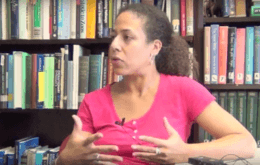Cassandra Extavour facts for kids
Quick facts for kids
Cassandra Extavour
|
|
|---|---|

Cassandra Extavour being interviewed in 2015
|
|
| Nationality | Canadian |
| Education | University of Toronto Autonomous University of Madrid |
| Scientific career | |
| Fields | Evolutionary Genetics |
| Institutions | Harvard University Handel and Haydn Society Emmanuel Music |
| Thesis | Germ Cell Selection in Genetic Mosaics in Drosophila melanogaster (2001) |
Cassandra Extavour is a Canadian scientist who studies genetics. She is a professor at Harvard University, where she teaches about molecules and cell biology. Her work focuses on how living things change over time (this is called evolutionary biology). She also studies how living things grow and develop.
Professor Extavour is famous for showing that special cells, called germ cells, compete with each other. This happens before they become reproductive cells. She also led a group called EDEN. This group helped scientists share new ways to study many different kinds of living things.
Contents
Early life and growing up
Cassandra Extavour grew up in a family with different backgrounds. Her father was from Trinidad and Tobago, and her mother was from Switzerland and Hungary. She says this mix was very important to who she is.
Her father helped start a celebration in Canada. It honored Martin Luther King Jr., a famous civil rights leader. Cassandra was very proud of her dad's work. Her father also played in an Afro-Caribbean band. He would put her on stage with him when she was only five years old. He encouraged her to learn many musical instruments. These included the flute, violin, and steel pan.
She did not know she was good at science until high school. She did well in her math and science classes. This made her think about a science career. Before that, she only thought about being a musician or a baker. She first liked psychology and how the brain works. But her interest in how living things develop grew. This happened during a summer job at the University of Toronto.
Science career and discoveries
Studying at university
Cassandra Extavour earned her first science degree from the University of Toronto. She then got her Ph.D. (a high-level science degree) in 2001. Her research was about how germ cells are chosen in fruit flies. This important work was published in a science journal called PNAS.
Discoveries about germ cells
In 2003, Professor Extavour did a study at Cambridge University. She looked at how animal germ cells are formed. She found that these cells are often told what to become by signals from other cells. This was different from what many scientists thought. Most believed that germ cells were usually set from the very beginning by the mother's cells.
In 2013, she explained her research. She said that in some animals, cells are already set to be germ cells before an embryo even forms. But in other animals, cells get chemical signals from nearby cells. These signals tell them to become germ cells.
Research at Harvard University
In 2007, Cassandra Extavour started her own lab. It was at Harvard University. She began as an Assistant Professor. She became a full Professor in 2014.
Her lab did important research on BMPs. These are special proteins. They can help create primordial germ cells (PGCs) very early in an embryo's life. Her team found that two BMPs, BMP8b and BMP4, help make PGCs in crickets. This was a big discovery. It was the first time scientists saw a specific signal pathway working to create embryonic germ cells in an Invertebrate.
Leading the EDEN network
From 2010 to 2015, Professor Extavour led a national science group called EDEN. This stands for Evo-Devo-Eco Network. The group got money from the National Science Foundation. EDEN helped scientists share tools and methods. This allowed them to study more types of living things.
Professor Extavour believes that we cannot answer big questions about evolution by studying just one animal. She hopes that science will move beyond only studying a few "model" animals.
Awards and recognition
Cassandra Extavour has received several honors for her work:
- She was named a Harvard College Professor in 2020.
- She received the Ellison Medical Foundation New Scholar in Aging Award.
- She was nominated for the Joseph R. Levenson Memorial Teaching Prize at Harvard.
- She was nominated for the Harvard Graduate Women in Science and Engineering Mentoring Award in 2012.
- She received an EMBO Short Term Fellowship in 2001.
Music and singing
Cassandra Extavour is also a professional singer. She sings Classical and Baroque music. She has a soprano voice. She works as a full-time scientist, but she also sings part-time.
She has been a musician since she was five years old. She became a professional classical singer during her college years. Now, she performs with many professional groups around the world.
When she lived in Spain, she studied singing with famous teachers. She has sung alone with groups like Alia Musica in Madrid. She also performed with Capella de Ministrers in Valencia, Spain. She sang in operas like Mozart's The Marriage of Figaro. In 2016, she sang as a soloist in Handel's Messiah in New Zealand. She also sings in the Handel and Haydn Society chorus in Boston.
See also
 In Spanish: Cassandra Extavour para niños
In Spanish: Cassandra Extavour para niños
 | Mary Eliza Mahoney |
 | Susie King Taylor |
 | Ida Gray |
 | Eliza Ann Grier |

